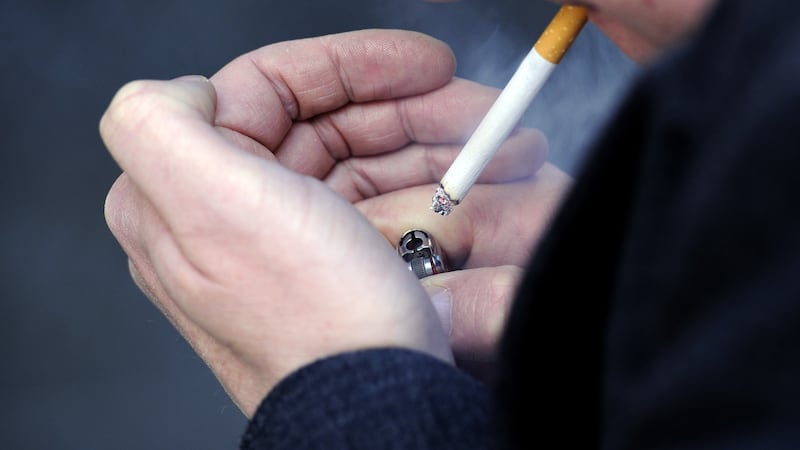In The Irish News (September 18 2017) letters page I outlined an apparent difficulty that two of our main broadcasting companies had with the use of the written place name Derry, specifically, on their weather maps.
Recently I listened and watched some of the people who helped craft the Good Friday Agreement on television. I know that some of its ideals were far reaching and implementation goals difficult. However, those people were trying hard to help us move forward and fair play to them.
Others, I noted had a difficulty with words too. ‘The Belfast Agreement’ said some unionists emphatically, ‘but we didn’t even want it anyway’.
This is the worst case scenario. To up front, sign up and declare your support for a historical agreement, then among your own party members say, ‘we are only joking, we don’t support the agreement at all’.
The strictly adhered to policy of the broadcasters appears to be: ‘Do not allow Derry citizens the right to have their city named on weather maps and since we treat them as second-class citizens we will do the same with news reports – Londonderry first, Derry second.’
This sounds the epitome of pettiness, but remember, it’s the BBC and UTV who have sat down, discussed their programme content and come up with these discriminatory policies.
It is licence fee payers and businesses who advertise that pay the salaries of these people which is a good enough reason for them to think long and hard about their professional practice.
The BBC, describing a job advertisement for head of news in NI, insisted that its culture ‘embraces people’s diverse perspectives and creates a positive environment where everyone belongs’. They go on to say, ‘we are committed to reflecting and representing the diversity of the UK and Ireland.’
We’ll have a bit of that in Derry, if you don’t mind.
The BBC weather map will, for example, on a daily basis show the first and second cities of Scotland a few centimetres apart. This is, of course, Glasgow and Edinburgh.
It doesn’t take a huge amount of grey matter to understand this concept of place names.
The question must be asked, if you can put up on the weather map for Scotland, Glasgow, Edinburgh why can’t you put up Belfast, Derry on the NI map?
Effective honest cultural identity in the drawing up of weather maps, just like the BBC stipulates in the aforementioned job description, should not be that difficult.
How can the mechanisms of the Good Friday Agreement be made to work if we are not able to use the same principles on a weather map?
VIN McCULLAGH
Derry City
Contemptible to put elderly parents in fear of their lives
Attacks on elderly parents of PSNI personnel or any pensioner is probably one of the most cowardly acts that anyone can perpetrate. While those responsible have the right to criticise the PSNI or any other organisation it is contemptible to put elderly parents in fear of their lives in an attempt to intimidate people.
The only acceptable weapon in the present political situation is persuasion. But it seems that those involved in this type of intimidation don’t even believe themselves that they have a strong enough argument to dissuade people from making the conscious decision to join the police so they resort to these bully boy tactics.
While opposition to this intimidation is welcomed from politicians and particularly Sinn Féin-elected representatives it cannot be left solely to them to condemn these actions.
If it was so-called ordinary criminals who carried out these attacks or burgled three pensioners homes in a matter of 24 hours there would rightly be an outcry from civic society, Church leaders and community organisations. But their silence is deafening.
The PSNI must at all times carry out its responsibilities with the primacy of policing with the community determining their every action. There is no community support for the groups carrying out this intimidation but the PSNI should carry out its duty to safeguard the public in an impartial, mannerly and transparent way.
House searches which leave family members in fear is no more acceptable than the actions of those the PSNI claim to be tackling. This type of policing only provides some semblance of empathy with these unrepresentative groups.
So it is time for civic society, Church leaders and community organisations to stand together in opposition to intimidation in all its forms. It can’t simply be left to politicians and it cannot be selective.
DOMINIC DOHERTY
Derry City
Needs of deaf community not being taken seriously
Imagine growing up in your own home city but not being able to use your native language at the Post Office or when you visit the dentist or the doctor. Imagine having to rely on a family member to translate for you even when in hospital. This is the language discrimination suffered by our deaf community.
We hear a lot about the rights of speakers of Ulster Scots and Irish, but for these people communicating in spoken English is always an option when they need medical attention.
I was hoping that when Belfast City Council decided to appoint two language officers they would have taken the needs of the deaf community seriously but apparently not.
Look at how they have allocated roles to their two language officers. One post is advertised to look after the needs of Irish speakers and this post requires fluency in both spoken and written Irish. By contrast, applicants for the other language officer post which supposedly caters for the need of users of sign language does not have any requirement that they can communicate in sign language, neither BSL or ISL.
We know that someone who wants to talk to the Irish language officer about the needs of the Irish language community will be perfectly capable of speaking temporarily in English, but most deaf people simply do not have the option of communicating in spoken English. There is a greater need for one of the officers to have BSL or ISL than there is to have fluent Irish.
It is inevitable that the needs of the deaf community are less visible because of communication difficulties, but it is shocking and utterly disgraceful that just because the deaf have not taken to the streets with protests, their needs are virtually ignored by our elected councillors.
A CARTON
Belfast BT6
Put patients’ lives first
Women with incurable breast cancer in Scotland are being cruelly denied more time to live, because they can’t get a drug called Perjeta.
Perjeta is a life changing drug that has been the standard of care in England for over four years. Its benefits are extraordinary, offering women with incurable HER 2-positive secondary breast cancer nearly 16 extra months of life on average compared to other treatments.
Women in England and Wales can get this drug as a matter of course on the NHS – in Scotland, they can’t. This means that some women could be forced to use their life-savings to pay for it or plead for the NHS to make a special case for them. But most women will miss out on this life-extending drug altogether.
The fact that a deal has been reached in England and Wales proves that it is possible for Perjeta to be made available on the NHS.
That’s why I’ve signed Breast Cancer Now’s ‘Perjeta Now’ petition calling for manufacturer Roche, the Scottish government and the Scottish Medicines Consortium to put patients’ lives first and agree a deal to make Perjeta available at a price the NHS can afford.
We know that negotiations are happening and campaigning can put public pressure on those around the table to reach a deal quickly.
Please sign the petition at breastcancernow.org/perjeta.
CAROLINE GIRVIN
Ballywater, Co Down







